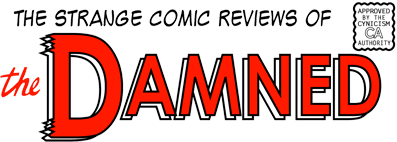

Oni Love Can Break Your Heart
Love Fights Vol. 2
Although I keep giving Andi Watson a chance, I never quite like his work as much as I think I should. For some reason, despite the numerous similarities between his work and work which I do enjoy on a regular basis, there are always reasons why it never matches up with my expectations. Love Fights remains true to form by presenting an agreeable, if inconsistent work that nevertheless succeeded in entertaining me despite numerous flaws.
I enjoyed Geisha, although I thought the story in the Geisha Special was much stronger than the original limited series. I actively disliked Breakfast After Noon, which has to be one of my least favorite comics ever - I can't really say its a bad comic, because it was certainly executed with the same competence as the rest of his material, and many intelligent people have professed to love it. But I thought the characters were pathologically unlikeable, which severely hampered my ability to appreciate whether or not said characters ended up together or not in the end. I rather wanted to throw them both down an elevator shaft (I had a similar reaction to High Fidelity, oddly enough, and for much the same reasons).
Love Fights is much more enjoyable than Breakfast After Noon, but for whatever reasons it is still strangely limpid in places. I think, however, that I may have succeeded in pinpointing one of the reasons for my dissatisfaction with Watson's work: the artwork, which manages to be simultaneously appealing and repellent to me.
On the one hand, he's got an extremely interesting and bold style, very much unlike anything else you are likely to see in comics. His style shares a great deal in common with those of certain particularly ascetic single-panel cartoonists, albeit with even more of superfluous detail sucked out. All that's left is almost the skeleton of a drawing. On a cover or a pin-up, it looks fantastic, with a strong sense of design that draws your eye inward.
But the drawback of this is that it is a very difficult style with which to tell a story. Its almost as if we were seeing thumbnail sketches of the story instead of the actual story itself. The forms and shapes on the page lack any heft, resembling the bare outlines of composition more than they do actual storytelling. You could perhaps draw a comparison with Seth: but whereas Seth's work actively draws the reader into the narrative, despite it's clear minimalism and efficiency of design, Watson's emaciated linework actively draws me out of the story. Perhaps this is merely personal preference, but I'd be interested in hearing if I were the only one with this problem.
The story in Love Fights is similarly problematic. The narrative thrust of this second volume hinges on a plot element that contains a hole big enough to drive a truck through it: mainly, that if comic book companies are privy to the exact details of the superheroes' every adventure, then they would also not only be privy to secret adventures, but to adventures which the heroes didn't remember themselves, despite the fact that said "secret" adventures were detailed in publicly published and distributed comic books. I have a hard time believing that the superheroes would be unaware of intimately important facets of their existence that were publicly known to anyone who produced or read their comic books.
But if you can leave aside that significant problem, the story is actually quite clever. It hinges on a number of familiar superhero tropes that Watson manages to weave in and out of the narrative quite dexterously. The only problem I have here is the fact that for large chunks of the book the precarious balance between the romantic and superhero elements is pretty much moot by the overwhelming superheroics. The first book, even though it sets up an incomplete mystery, is much more thematically satisfying because of the deft way in which Watson doesn't allow either of the genres to overwhelm the other. This volume leans very heavily towards the superheroic, at the expense of the romantic stuff which remains Watson's bread and butter.
The book's conclusion will no doubt seem perfect for fans of Watson's earlier work, although it struck me as similarly problematic. If I may be blunt, the problem I have here is that I have simply no patience with characters who don't have the guts to say what they mean instead of dancing around what they really want. Perhaps this is my own personal bias sneaking in, but I have a big problem with people who can't come right out and say what they mean when the chips are down. In real life, people like that are called flakes - and I have about as much patience for fictional flakes as I do for the real world kind.
But despite my dislike of his typically weak characters, Watson still manages to redeem the book through his realistic and telling bits of character interplay. Although there are a number of exposition-heavy scenes that derail the book's conversational rhythms, the majority of the book flits along with a keen ear towards the kind of believable and beguiling syntactical flow which remain perhaps Watson's greatest strength.
So while there are enough problems to keep me from whole-heartedly recommending it - and there are certainly a number of idiosyncracies native to Watson's work which prevent me from becoming as fully immersed in the book as I would like - there were still enough good things about it to keep me interested. Although his batting average with me is still far more miss than hit, there's just enough here that works to keep me interested in whatever he does next.





No comments :
Post a Comment